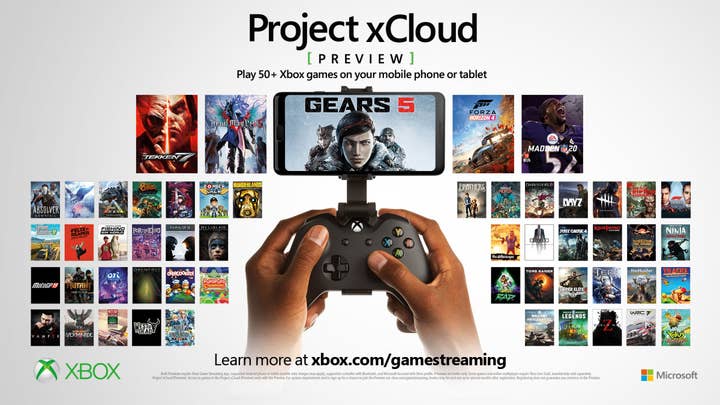Xbox: "People are using xCloud to create couch co-op"
Microsoft's xCloud leaders discuss what they've learned -- and still need to learn -- about game streaming
I feel for the manager who had to get the budget for xCloud signed off.
I can only imagine the answers to the chief financial officer's questions. How much money will it make? Not entirely sure. What's the business model? We're still working that out. What games will people play on it? Pass. Surely you know who the audience is? *shrugs*.
Yet streaming has been signed off, and some of the biggest companies in games are racing to find the answers to those questions. Xbox launched its streaming service in the UK, US and South Korea just over a month ago in a 'Preview' state, featuring just four games.
"It's really important to us that we're very open about what we're doing every step of the way," says general manager of Project xCloud Catherine Gluckstein. "We have Reddit threads open with our community. We kicked off Preview in three countries for very particular reasons. The US and UK are obviously mature Xbox markets, but we wanted to look at what it took to extend gameplay. And then South Korea is a market leader in telcos. We're partnering there with SK Telecom to really look at the possibilities of 5G and also the potential of a market which isn't a traditional console market but a very big PC gaming market.

"We started small. We started with four first-party games, and now we have 50 games playable in Preview and we're going to be inviting many more people to join us. We're taking Preview to Canada, to Western Europe, to Japan and to India. Japan is a very big console gaming market, but not traditionally a big market for Xbox. It's interesting to see how we play within that. With India today, there are more people who play games in India than the population of the US -- about 300 million. It's a huge gaming market, but not one we've played in before. It's a really interesting place for us to go and learn.
"We're working with a tonne of partners to bring Project xCloud to every device. With the games, what we've tried to choose -- because this is a really interesting paradigm with cloud gaming -- is a broad variety of games to understand the gameplay changes when people stream content. Do they play for different lengths of time? Do they want to play different types of games?"
There are lots of things still to work out in terms of games, territories, pricing and interest. But one month in, what has the xCloud team discovered already?
"There are more people who play games in India than the population of the US -- about 300 million. It's a huge gaming market but not one we've played in before"
Catherine Gluckstein
"We've learnt a lot of things on the tech side," reveals Kareem Choudhry, corporate vice president of Gaming Cloud at Microsoft. "My favourite one was when we launched in our preview, we started noticing that some of our Xbox Live anti-cheat detection was triggering. It turns out that because you're playing on a console that's housed in a data centre, its ping time to the server is incredibly low -- sometimes 0ms. And the algorithms we've made to detect cheating over the years see that as something that shouldn't happen. It was never before realistic for a client to have a 0ms ping time. We had to go in and update some of our anti-cheat detection."
Gluckstein adds: "The UK south data centre has been our busiest data centre of all the markets that we're serving. The key time that people are playing is interestingly between eight and ten at night. You see things you didn't necessarily expect. With new people coming in, we've seen terrific engagement with people new to the Xbox ecosystem and the levels of play are on par with something we'd see from traditional Xbox users."
Choudhry again: "Sea of Thieves [one of the games in Preview] doesn't support couch co-op. People in the programme are using Project xCloud to create a couch co-op experience. When I'm playing at home, one of my kids is playing on Xbox One X, another is on my Surface Book 2 and I'm sat right next to them on Project xCloud. We're all in the same room playing together. A good percentage of the love notes we've received have been about someone else in the household monopolising a TV yet they can now still play."

How xCloud can augment the experience for existing Xbox players is certainly intriguing. This group of people will most likely be using the service at the start. But the real excitement, as Xbox chief Phil Spencer told us back in June, is the prospect of unlocking new territories like India and South Korea. Gluckstein says Microsoft will keep exploring these sectors, and the key metric is to find out how much time these people will be spending with games via xCloud.
"One of the things we're really looking at in Preview is just the amount of engagement we see," she says. "In a more mature market like the US or UK, we can look across our ecosystem and see that a player in Preview who is playing Halo 5 is playing about two thirds of their time on console and one third on cloud. Obviously, when we get to a country like India, that will be a little bit different as we don't have that kind of history.
"It really comes down to engagement. We really think that engagement is one of the first indicators that we're onto something successful. In India, we'll be thinking a lot about whether we're going to test on a mobile phone or whether we're going to test on PC or whatever, and really defining it around those."
"A good percentage of the love notes we've received have been about someone else in the household monopolising a TV yet they can now still play"
Kareem Choudhry
This will be a multi-year journey for Microsoft, and the xCloud team will be prioritising its time when trialing these new ideas.
"We're taking a long-term approach," Choudhry explains. "We've done something very similar in the console where we deploy new console updates to a set of consumers and then we get their feedback. For us, it's more important that we get this correct, so we're going to do it in an open and transparent way. We started four weeks ago with four games in three markets. Today there's over 50 games. It's an ever-expanding model."
Another area the xCloud team is having to study is controls. Xbox has expanded the number of controllers that can be used with xCloud, including the PlayStation Dualshock 4. That move in particular seems like a savvy one, as the PS4 pad exists in some 100 million households worldwide. Yet the potential for cloud gaming is to win over consumers who don't have a console at all. The kind of people who don't own a controller, or may not even know how to use one.
"It is something we think about a lot," Gluckstein says. "Right now in Preview, we're live with the [Xbox] controller but we are looking at what touch controls would look like. There's a lot of work around that. We also put the API out to the development community because we think that's where the real genius is going to come in terms of how they build games. All over we're having to think in different ways than we have about our community.
"We've had touch controls up and running on some of these games for many months, we just didn't feel they were at a point we wanted to roll them out. We will bring them."

Choudhry continues: "What we'll probably do is take more of a platform approach where we can generically map a controller to touch controls while at the same time leveraging our heritage with the game development community to enable them to say what touch controls they want in their game. The system we've set up is something they're able to work on without having to modify their game as well. It all happens on the client. They don't have to crack open the bits or redevelop the game.
"The other thing I'll say is, I watch my kids and they can type an email on their phone better than I can on a keyboard and I'm just blown away. The fact that a controller mapped to touch controls is something that doesn't work for me personally... if you think about a country like some parts of the continent of Africa, that population is very youthful and they're smartphone first and only. What's normal and acceptable for us is going to change over time, too."
Gluckstein again: "That's one of the fascinations of cloud gaming, is that it changes these paradigms."
"We've had touch controls running on some of these games for many months, we just didn't feel they were at a point we wanted to roll them out"
Catherine Gluckstein
And not just with controls. Choudhry believes that there will be a number of things developers will want to do to make their games better suited to the streaming environment.
"I've been working in gaming for about 20 years and what I've noticed is that every technological advancement results in two things: firstly, an explosion and diversity of content that takes advantage of that new technological base, and two, just a proliferation of diversity of business models.
"To get a little bit more longer term on our strategy, we're starting a lift and shift at taking the content that works phenomenally well on our console, putting it into the data centres and making it streamable without any additional development work required. We do it all for the IP owners.
"The next evolution is really something that we call 'cloud aware', where we've all put in the APIs and SDKs so the game can query: 'Am I streaming? What device am I streaming to? How big is this screen?' If they wanted to they can make on the fly adjustments, like changing font sizes or putting some of their latency mitigation code from the multiplayer stack over to the input stack.
"Then eventually the place we get to is this notion of being a cloud native game, one that runs holistically in the cloud and then streams to multiple endpoints. That's the arc that we're on right now and we're starting with a platform that supports over 3,000 games that run over Xbox today."
Microsoft believes it is well placed to be the leader in this space. When asked about the competition, Choudhry didn't name anyone, but he states how important a legacy of content will be in winning over consumers -- content that only established games companies can provide.
"We're more focused on the customers and what we can do for them than we are looking over our shoulder," he concludes. "We really think the key ingredients are the three Cs -- content, community and cloud. We have a phenomenal first-party cloud in Azure, 54 regions in 140 countries... that distribution and reach is an incredible asset. We have the content library, both first-party and third-party in the Game Pass subscription. And we've got the vibrant multiplayer community already.
"Any company that wants to be successful in the streaming space, I believe they're going to need significant investment, history, heritage and success across all three of those at the same time and combine them in the right way. I like our position."
